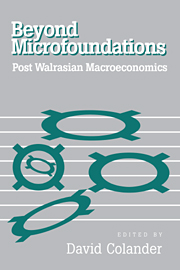Book contents
- Frontmatter
- Contents
- About the authors
- Preface
- 1 Overview
- I The Post Walrasian macroeconomic vision
- II The underpinnings of Post Walrasian macroeconomics
- III Modeling a Post Walrasian economy
- IV New structuralist macroeconomics vs. Post Walrasian macroeconomics
- IV Appendix: Literature Survey
- An annotated bibliography on the (macro)foundation of Post Walrasian economics
- Name Index
- Subject Index
An annotated bibliography on the (macro)foundation of Post Walrasian economics
Published online by Cambridge University Press: 05 June 2012
- Frontmatter
- Contents
- About the authors
- Preface
- 1 Overview
- I The Post Walrasian macroeconomic vision
- II The underpinnings of Post Walrasian macroeconomics
- III Modeling a Post Walrasian economy
- IV New structuralist macroeconomics vs. Post Walrasian macroeconomics
- IV Appendix: Literature Survey
- An annotated bibliography on the (macro)foundation of Post Walrasian economics
- Name Index
- Subject Index
Summary
Introduction
The idea that microeconomics must have a macrofoundation lies at the heart of the Post Walrasian approach. What is meant by the (Macro)foundation of (Post Walrasian) economies? To some, it almost looks like a contradiction in terms, convinced as they are that micro has to be basis for macro. To others, it is the only fruitful way to discuss the behavior of economic agents, convinced as they are that it makes no sense to discuss economic behavior in a non-contextual way. We hope to illustrate with this annotated bibliography that depending on the definition of micro, those two views on the proper foundation of economics can be reconciled. So this is an attempt to define and classify this field of research. Fortunately, we do not have to start from scratch. Recently, the field has already been explored quite extensively, mostly, but not solely, under the heading of what is known as New Keynesian Economics. However, the classification scheme for New Keynesian economics as suggested in the literature by, for example, Mankiw and Romer (1991) and Gordon (1990) who particularly focus on short-run price and wage stickiness, is not the one we are aiming at.
Our idea of a (macro)foundation of (Post Walrasian) economics is centered around the concept of coordination failures. Following Howitt (1988) it can be observed that the coordination of economic activity has many dimensions, which in neoclassical economics have all been embodied in the view that full price flexibility solves them all.
Information
- Type
- Chapter
- Information
- Beyond MicrofoundationsPost Walrasian Economics, pp. 223 - 252Publisher: Cambridge University PressPrint publication year: 1996
